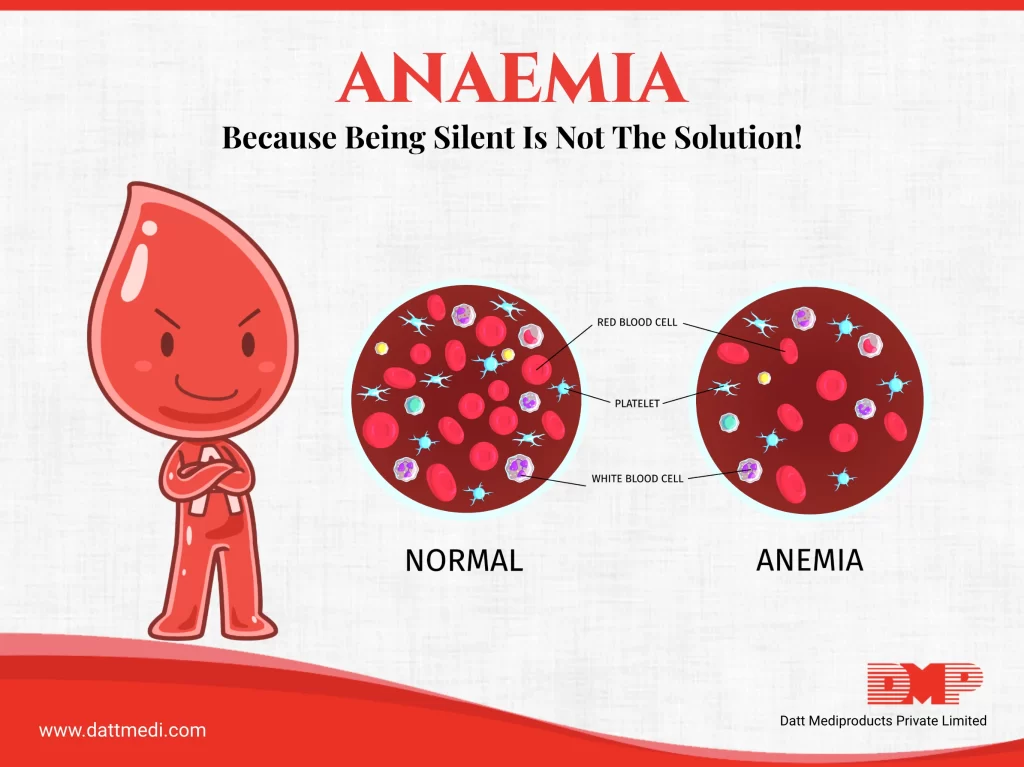
Anaemia is a condition where there are not enough healthy red blood cells (RBCs) in the body. Our body needs Iron to make haemoglobin (HGB). HGB is a major protein of RBC and is responsible for carrying oxygen throughout the body. So as a result low HGB level means not enough oxygen supply is getting to the tissues and the organs leading to symptoms like fatigue and shortness of breath.
Different kinds of anaemia are divided under various groups such as Aplastic anaemia, IDA, Sickle cell anaemia to name a few.
Anaemia may be caused due to:
-Loss of blood
-Lack of red blood cell production
-High rates of red blood cell destruction
-Taking diet deficient in Iron, Vitamin B12 and Folic acid
-Certain long term chronic diseases like cancer, infection, lupus, diabetes, and rheumatoid arthritis also cause anaemia.
Spot the Symptoms
The symptoms of anaemia may be short term or chronic and the condition is generally treatable if diagnosed timely. The symptoms may become worse if left untreated.
Some of them are listed below:
-Fatigu
-Shortness of breath
-Feeling cold
-Dizziness or weakness
-Headache
-Sore tongue
-Pale skin, dry skin, or easily bruised skin
-Unintended movement in the lower leg (restless legs syndrome)
-Fast heartbeat
Is anaemia gender biased?
Anyone can develop anaemia irrespective of age and gender, though it is twice as prevalent in females as compared to males.
The Union Health Ministry released a National Family Health Survey (NFHS) and it showed an increasing trend of anaemia across age groups, particularly among children and women.
|
Children aged 6-59 months |
Females aged 15-19 years |
|
67.1 per cent |
59.1 per cent |
Children aged 1 to 2 years need more Iron during growth; Young girls and women loose blood during monthly periods and childbirth.
An article published in Lancet reflects that only 21·7% of men had anaemia, which was substantially lower than the 53·2% among women.
Women, Please take it seriously!
Women are at high risk of iron deficiency anaemia, particularly those who are pregnant and the ones who face heavy menstrual periods. Women generally take their health for granted and their priority shifts towards the family. Ignoring anaemia signs such as lethargy and fatigue might lead to severe health problems, reduced exercise capacity and poor work performance.
Prevent Iron-deficiency anaemia by following these:
-Iron absorption is two to three times better in animal-based foods as compared to the plant based diets. Iron absorption from plant-based foods is better when they are eaten with Vitamin C rich foods like oranges, tomatoes, strawberries, broccoli.
-Iron rich plant based foods include green leafy vegetables, lentils, soyabeans, chickpeas, fortified cereals.
-Cut down coffee and tea intake along with meals as caffeine interferes with iron absorption.
-Do not take Calcium and Iron supplements simultaneously as it impairs Iron absorption
-Oral iron supplements can also be taken to increase the haemoglobin.
Always seek medical advice
Always consult a healthcare provider, because just popping iron pills many a times does not control the situation and may lead to problems caused by too much iron in the body. Your physician will help find the cause for the anaemia and provide the best suited treatment (as per the diagnosis).
Take care of yourself
Anaemia is a silent killer and affects both young and old; males and females. So, it is important to identify the aforesaid symptoms timely and take necessary action to avert the situation and have a better quality of life.
As, being silent is not the solution for Anaemia.
You can follow us @dattmediproducts for such informative healthy tips.




